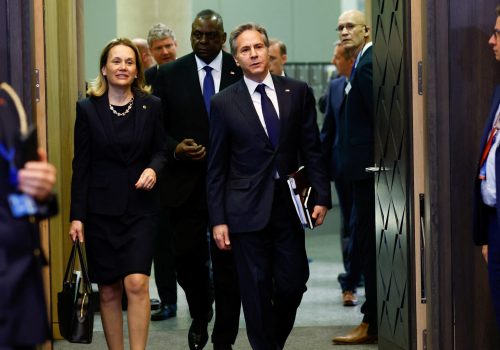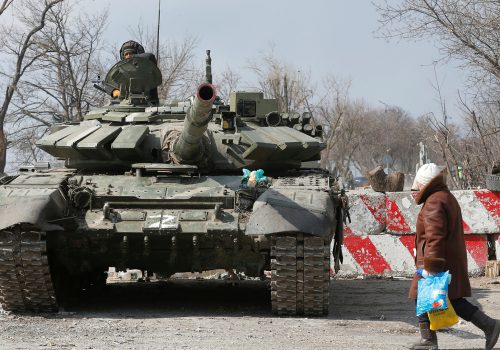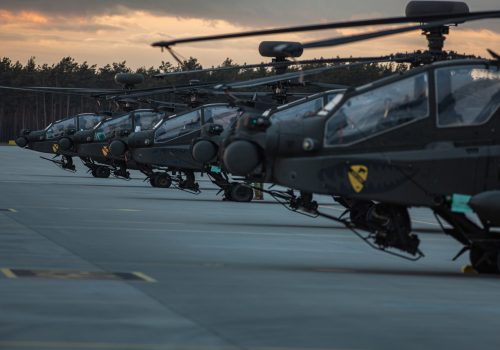FAST THINKING: What will the West do if Putin uses chemical weapons?
GET UP TO SPEED
United front in Europe, meet the front lines in Ukraine. US President Joe Biden’s visit to Europe this week included a trio of summits—with gatherings of NATO, Group of Seven (G7), and European Council leaders—to coordinate military and economic responses to Russia’s war, plus a visit to Poland to meet US troops and Ukrainian refugees. As Biden announced new humanitarian efforts, while remaining vague on a potential Western response to any Russian use of chemical weapons, the big question remains: Is transatlantic unity enough to rescue Ukraine? Our experts are here to break down Biden’s Eurotrip.
TODAY’S EXPERT REACTION COURTESY OF
- Chris Skaluba (@ACScowcroft): Director of the Scowcroft Center’s Transatlantic Security Initiative and former principal director for European & NATO policy at the US Defense Department
- Melinda Haring (@melindaharing): Deputy director of the Eurasia Center
- Rachel Rizzo (@RachelRizzo): Nonresident senior fellow at the Europe Center
Military matters
- The main announcement from Thursday’s NATO summit was the deployment of new NATO battle groups to Bulgaria, Hungary, Romania, and Slovakia to bolster the Alliance’s eastern flank. But the big news was the discussion around what to do if Russia deploys chemical or biological weapons in Ukraine—a scenario that NATO leaders said would provoke “severe consequences.”
- That “feels like a soft red line and a back door for the possible introduction of NATO forces into Ukraine,” Chris says. “What ‘severe consequences’ look like on top of the various economic and military penalties already in play strains the imagination short of direct NATO involvement inside Ukraine.”
- Because of its short notice, the NATO summit was mostly “an instance of NATO flexing its political muscles rather than its military ones,” Chris tells us. There was, for instance, the sight of French President Emmanuel Macron wrapping his arms around Biden and British Prime Minister Boris Johnson, “an image unimaginable just eighteen months ago amidst the tumult of the Trump and Brexit era.”
- Those same vibes were evident in Biden’s trip to Poland, Chris adds: “After years of strained relations between Warsaw and Washington over issues of democratic backsliding in Poland, this is another example of the crisis as an impetus to repairing damaged relationships.”
The human toll
- Biden’s visit today to Poland, the top destination for Ukrainian refugees, came with a pledge to admit one hundred thousand Ukrainians into the United States this year and spend one billion dollars on humanitarian efforts—a welcome move, Melinda says, after “the White House had done zero” on refugees for the first month of the war.
- But there’s much more to be done within Ukraine, she adds, starting with “a real humanitarian corridor” for civilians caught in the conflict, “especially in Mariupol, where people can be removed by vehicle or boat.”
- She says Biden and Macron should call the Kremlin to negotiate such a corridor. “Spare us the toothless statements about ‘the gravest threat to Euro-Atlantic security in decades’ and just send more weapons and find a way to get innocents out unscathed,” Melinda advises.
The long game
- While Thursday’s get-together had wartime drama, Rachel says NATO’s upcoming summit in June “is likely to be even more consequential” because the Alliance will debut its Strategic Concept there—with what’s expected to be a new focus on China.
- The war in Ukraine clearly shows why NATO can’t take its strategic attention away from Russia, but Rachel notes that the US pivot to the Indo-Pacific will continue regardless. And that means “Europe will have to up its defense capabilities to deal with the permanent threat on its eastern flank.”
- While NATO took the unusual step on Thursday of calling out China with a warning against backing Russia’s war effort, Rachel argues that NATO is not the best forum to confront Beijing’s influence—since the Alliance should stick to military matters. “China will remain a strategic challenge for years to come, but the economic and political inroads the country has made throughout Europe are better addressed by the European Union itself,” she says.
- In the United States, meanwhile, Chris argues that the Biden administration is at last seizing “the strategic opportunity” within the crisis over Ukraine to accomplish several goals: “helping democracy prevail while autocratic reputations suffer, revitalizing transatlantic institutions like NATO, moderating debate among a polarized electorate around an issue that has broad bipartisan appeal, and showcasing to the world that America is truly back.”
Further reading
Thu, Mar 24, 2022
‘All options are on the table’ for eastern flank, says US Permanent Representative to NATO
New Atlanticist By Katherine Golden
At an Atlantic Council Front Page event, Julianne Smith laid out ways the United States and its allies can face up to Russia and strengthen European security.
Wed, Mar 23, 2022
Russia Crisis Military Assessment: Moscow’s increased threat against NATO intervention
New Atlanticist By
Russia has abandoned its goals of rapid victory. Here's what it's focusing on instead, according to our military fellows.
Wed, Mar 9, 2022
Defending every inch of NATO territory: Force posture options for strengthening deterrence in Europe
Issue Brief By
Deterrence in Europe can be enhanced through a range of US and NATO force posture enhancements.
Image: U.S. President Joe Biden gives a joint press statement with European Commission President Ursula von der Leyen at the U.S. Mission in Brussels, Belgium March 25, 2022. Photo via REUTERS/Evelyn Hockstein


